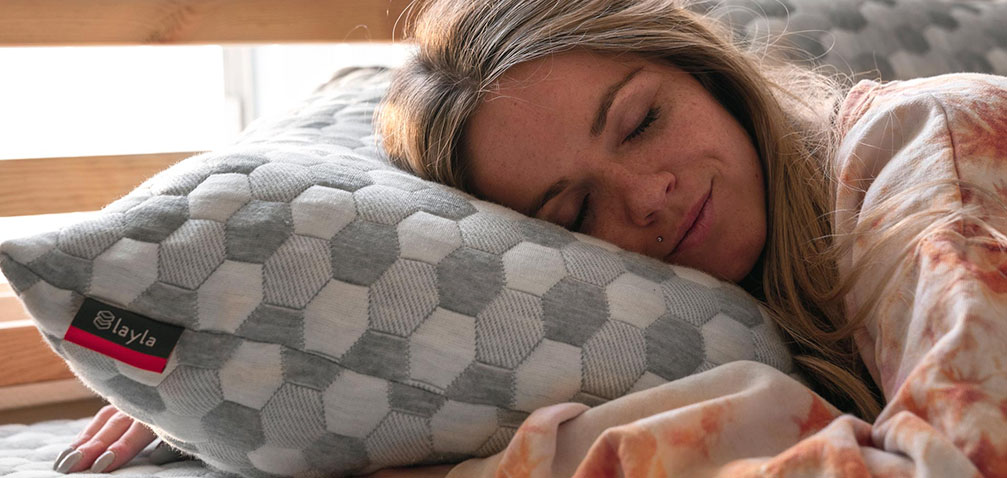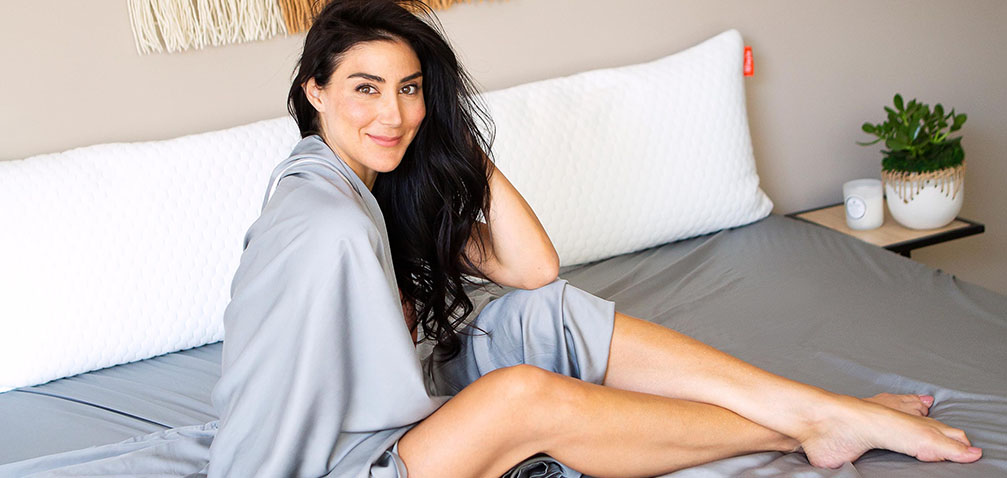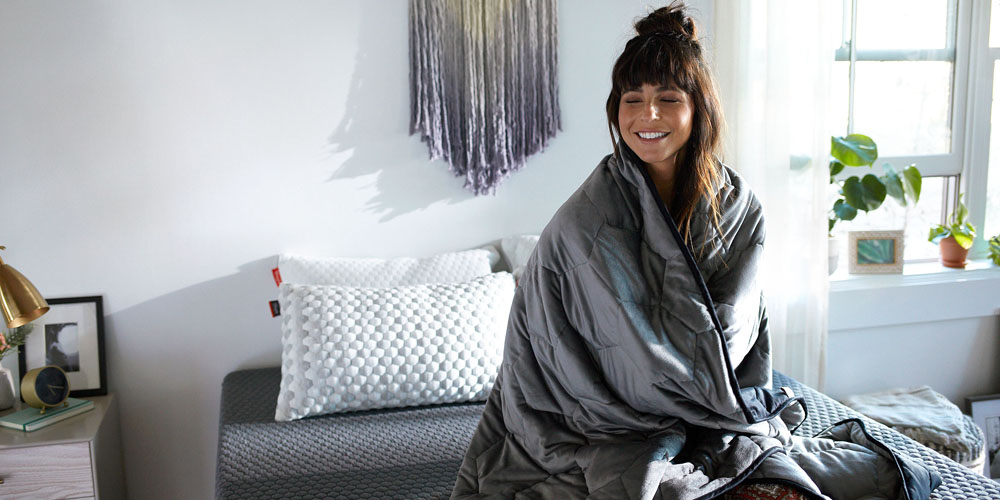Most adults know that getting enough sleep is important, but that doesn’t mean they practice what they preach and make sleep a priority. Between different lifestyles, job requirements, consumption of stimulants like caffeine, and health differences, good sleep health can be an elusive goal.
When determining how much sleep you need per night, your individual age, health situation, and lifestyle are some factors that determine your recommended amount. The National Sleep Foundation points out that it’s important to understand where you fall on the sleep needs spectrum by age, and to also take into consideration what’s affecting the quality and duration of your sleep. After all, 8 hours of poor sleep may not prove to be any more beneficial than 7 hours of uninterrupted sleep.
If you’re ready to revamp your relationship with sleep, we’re here to help. In this article, we’ll go over how much sleep you need by breaking it down by age and answer questions like “is six hours of sleep enough?” so everyone in your household can get enough shut-eye.
- How Many Hours of Sleep Is Enough?
- Is 6 Hours of Sleep Enough?
- What Are Signs of Sleep Deprivation?
- What Are Risk Factors of Getting 6 Hours of Sleep?
- Finding the Right Sleep Amount For You
How Many Hours of Sleep is Enough?
We’ve all heard the age-old proverb, “A good laugh and a long sleep are the best cures in the doctor’s book.” But how much sleep do you need? Sure, we know 8 hours is the recommended amount, but does this apply to everyone? Not necessarily. As we grow older, our bodies need different amounts of sleep for various reasons. For example, infants need more than half a day’s worth of sleep in order to grow and develop, while seniors require less sleep but need it to fight off illnesses and stay cognitively sharp.
Knowing how much sleep you need is important, no matter what decade you’re in. Below, you’ll find out how much sleep you need by age so that you can ensure you, your grandparents, and your children are getting enough rest.
How Much Sleep Do Babies Need?
Babies need a lot of sleep because their little bodies are going through rapid growth, and their brains are soaking up the world around them. Newborns will sleep a lot but tend to sleep in shorter spurts, requiring two to five naps throughout the day.
As babies get older, the total amount of sleep starts to diminish, but the amount of nighttime sleep will grow, which will help tired parents get more shut-eye as well. By three months old, or when a baby reaches 12-13 pounds, they begin to sleep through the night, with the majority of babies sleeping through the night regularly by 6 months old. Below are the new sleep recommendations rolled out by the National Sleep Foundation for babies:
- Newborns 0 to 3 months old recommended amount of sleep: 14 – 17 hours
- Infants 4 to 11 months old recommended amount of sleep: 12 – 15 hours
- Toddlers 1 to 2 years old recommended amount of sleep: 11 – 14 hours
How Much Sleep Do Children Need?
Once infants grow to become children, you may be wondering how much sleep kids need. Kids, like infants and toddlers, continue to grow and develop, both physically and cognitively. This means they still need at least half a day’s worth of sleep or around 12 hours. The only difference, however, is that children will get most of their sleep during the nighttime, with only one nap per day at most.
In a study published in the journal Sleep, researchers found that shorter sleep duration for kids can lead to a variety of adverse health consequences, including depression, an increased risk of obesity, impaired academic achievement, poor concentration, suicide ideation, and injuries. This is why it’s crucial for parents to create a positive sleeping environment and schedule in order for their children to get an adequate amount of sleep per night. Below are the National Sleep Foundation’s new sleep recommendations for kids:
- Preschoolers 3 to 5 years old recommended amount of sleep: 10 – 13 hours
- School-age children 6 to 13 years old recommended amount of sleep: 9 – 11 hours
How Much Sleep Do Teenagers Need?
If you think you’re done growing by 18, think again. The human brain fully develops when you turn 25, which means teens still need an adequate amount of sleep to aid in cognitive and physical development. Here’s how much sleep teenagers need according to the National Sleep Foundation’s sleep recommendations for teens:
- Teenagers 14 to 17 years old recommended amount of sleep: 8 – 10 hours
The National Sleep Foundation also notes that circadian rhythms shift after the onset of puberty. In most cases, this creates a teen sleep pattern that is drawn to going to bed after 11 p.m. and waking up later. Unfortunately, most school systems force teens to wake up earlier, between 7 a.m.-8 a.m., with one study finding that just 15% of teens slept for 8.5 hours per night.
While this isn’t ideal, you can help your teen get enough time between the sheets by establishing a fixed sleep schedule. This can be achieved by limiting the amount of screentime before bed, whether on their phone, TV, or video game console, and making their bedroom a sleep haven by investing in quality bedtime essentials like a weighted blanket or cooling copper mattress.
How Much Sleep Do Adults Need?
Once you reach adulthood, the amount of sleep you need per night begins to plateau for the next 40 years of your life. This means you’ll be able to establish a solid sleep schedule that allows you to squeeze in 4 or 5 sleep cycles per night.
There is no magic number when it comes to the optimal amount of sleep a person needs due to a variety of factors, such as lifestyle, health conditions, age, sex, and so forth. Instead, an adult’s sleep pattern is individual but should fall within the recommended guidelines established by leading organizations, such as the National Sleep Foundation. Their sleep recommendations for adults are listed below:
- Young adults 18 to 25 years old recommended amount of sleep: 7 – 9 hours
- Adults 26 to 64 years old recommended amount of sleep: 7 – 9 hours
In a study published in the Journal Nature and Science of Sleep, it was noted that insufficient sleep had become widespread in the past few decades, due to factors such as lack of physical activity, exposure to artificial light at night, poor sleep hygiene, and caffeine consumption. If you’re unsure whether you’re getting enough sleep per night, ask yourself if you feel energized from the moment you wake up until the moment you sleep. If the answer is “no,” then you might need to clean up your sleeping habits.
Some sleep hygiene tips that may help you catch more Zzz’s per night include drinking water before bed instead of caffeine, exercising regularly, removing screens from your bedroom, and establishing a sleep routine you can stick to.
How Much Sleep Do Seniors Need?
Once you reach your golden years and the pace of life begins to wind down, so will your sleep schedule. Of all age groups, seniors need the least amount of sleep. But this doesn’t mean older adults can get by with just five hours of sleep. However, 44 percent of the elderly population experience insomnia, which leads to seniors getting five or fewer hours of sleep per night.
If you or a loved one who’s over 65 don’t reach the National Sleep Foundation’s sleep recommendations for older adults listed below, it may be time to take action. Seniors who don’t get enough sleep per night have an increased risk of illness, such as heart disease, Alzheimer’s, and arthritis. This can be caused by reduced exercise throughout the day, as well as certain prescription drugs they take, and loud, excessive snoring caused by certain sleeping positions or other factors.
- Older Adults 65 years or older recommended amount of sleep: 7 – 8 hours
As you become an older adult, another change in your body’s biological clock occurs, similar to when you’re an adolescent. However, instead of staying up until 11 p.m., older adults begin to feel tired earlier in the evening and wake up earlier in the morning.
Is 6 Hours of Sleep Enough?
With so little time in the day, you may be wondering if it’s worth skimping out on sleep to get other tasks done, such as work, socializing, or watching a late-night movie. But is 6 hours of sleep enough? Even though the recommended amount of sleep you need per night dwindles as you age, seniors still need at least 7 hours of sleep compared to the 10-13 hours of sleep for babies.
So, is sleeping 6 hours enough to stay healthy and sharp? No. Not getting enough sleep can pose several health complications, such as impaired judgment and a weakened immune system, which we’ll discuss in detail further on. However, it’s okay to have a restless night on occasion, even if it’s not in your plan. Once 6 hours of sleep per night becomes a habit, though, issues can arise and disrupt your circadian rhythm.
What Are Signs of Sleep Deprivation?
If you’re starting to regularly get 6 hours of sleep per night or less, you might start to exhibit signs of sleep deprivation. Some indicators that you’re sleep deprived may include:
- Drowsiness
- Headaches
- Difficulty concentrating
- Physical weakness
- Grogginess
These are some of the symptoms you can experience when only getting 6 hours of sleep per night. However, consistent lack of sleep and sleep deprivation can post a wide range of risk factors, which we’ll explore in the next section.
What Are Risk Factors of Getting 6 Hours of Sleep?
Your body needs sleep to rest, restore, and rejuvenate. When your body isn’t given ample time to unwind and sleep at night, it can lead to several risk factors that can affect your health. Below are some risk factors of getting 6 hours of sleep per night that you should be aware of:
- Weakened immune system: As stated, your body needs sleep to repair itself. Inadequate sleep can weaken your immune system, making you more prone to certain illnesses.
- Weight gain: The longer you’re awake, the more likely you’ll get hungry again after dinner, which can put you at risk of weight gain. Additionally, studies have found that a lack of sleep can increase your appetite and cause you to crave high processed foods.
- Impaired judgment: When your body doesn’t get the deep sleep it needs to rejuvenate and repair your body, it can result in impaired judgment. This means it can be more difficult for you to focus and make smart decisions, which can be risky in certain scenarios, such as driving or making financial decisions.
So, after learning about these risk factors, is six hours of sleep enough? It’s always important to put your health first, which means getting a good night’s rest. There are plenty of natural sleep aids that can help improve your sleep, as well as ways to improve your nighttime routine to ensure you get your recommended amount of sleep each night.
Finding the Right Sleep Amount For You
Although scientists have found a gene present in about 3% of the population that can thrive off just 4 to 6 hours of sleep, for most people, this isn’t nearly enough. The best way to determine if you’re getting enough sleep is to take note of how you feel during your regular activities. A great night of sleep will result in you feeling energetic and alert throughout the day.
And of course, it’s not just the number of hours of sleep you get each night that determines how refreshed you feel in the morning, it’s also determined by the quality of your sleep and an uninterrupted sleep cycle. Knowing how much sleep you need, and how much sleep you need by age, are crucial to living a healthy, happy life. The first step to getting enough sleep is creating a sleep sanctuary. At Layla Sleep, we can make this happen. From our cooling pillows to our bamboo sheets and informational articles covering topics like how to choose a mattress, getting a good night’s sleep has never been easier.



